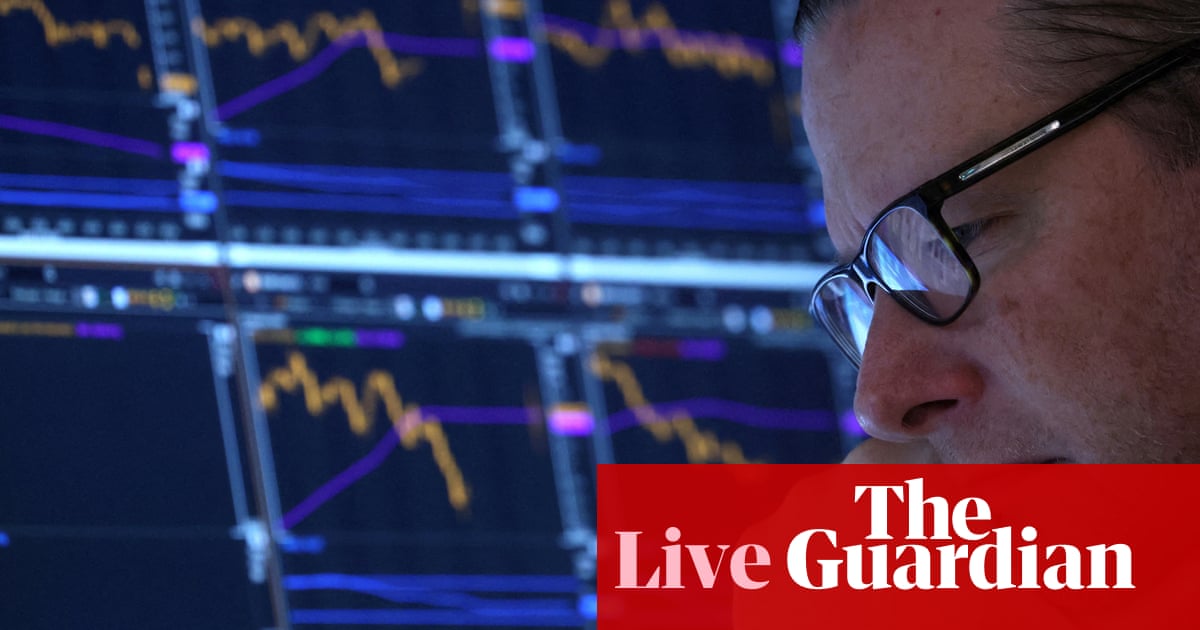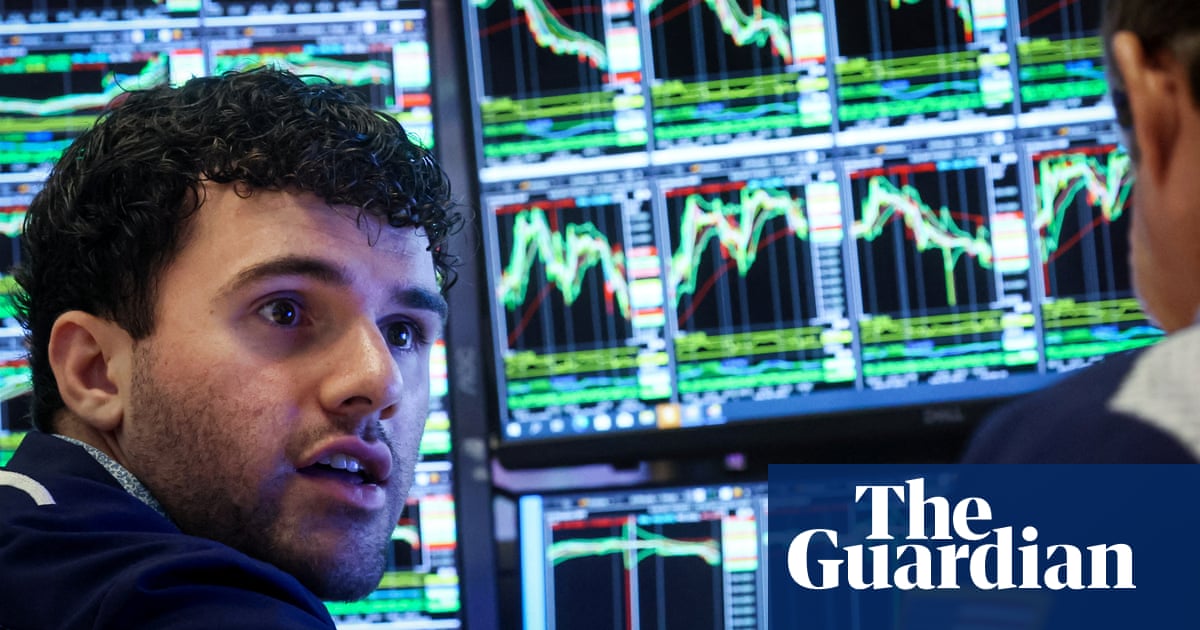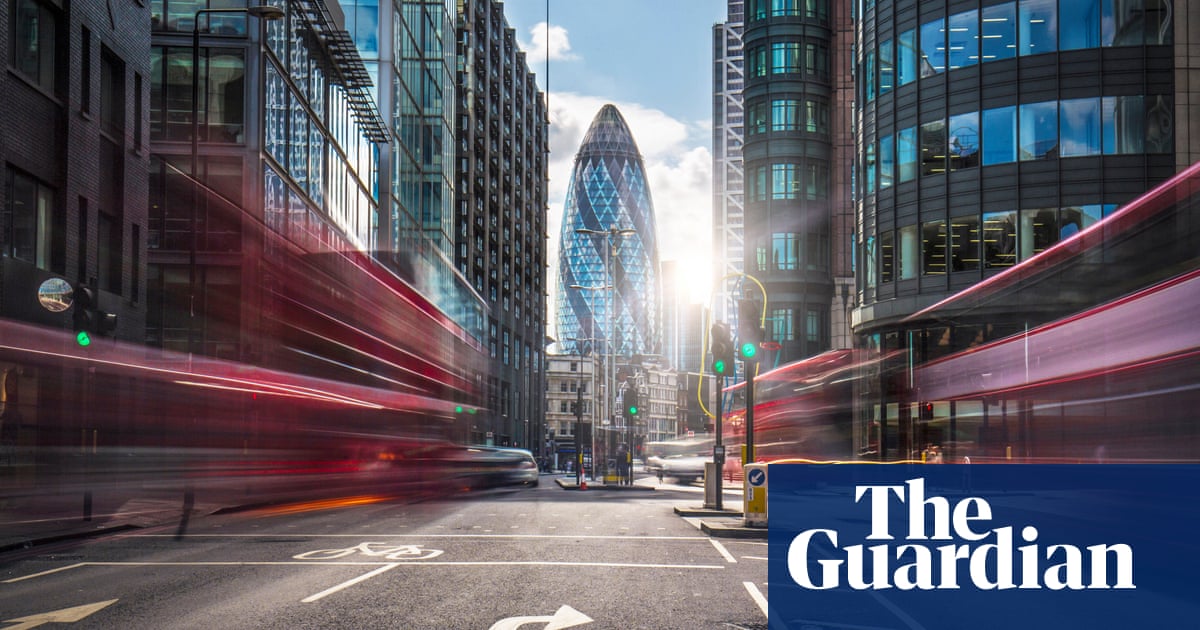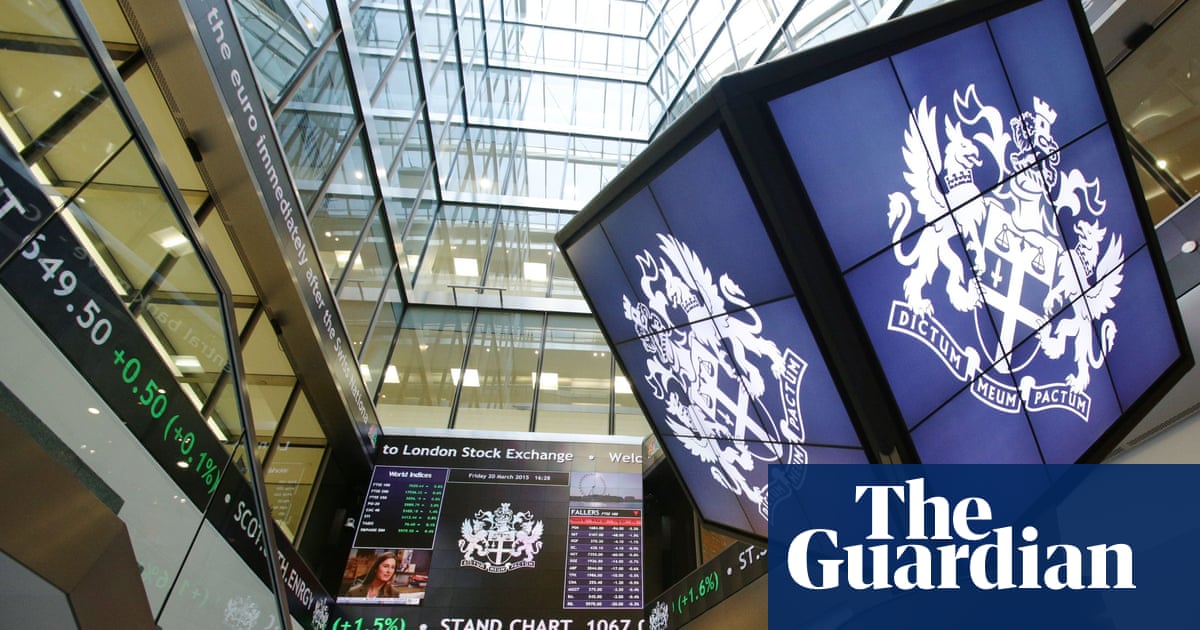
Afternoon summary
Time for a recap:
London’s stock market has posted its biggest one-day loss since March, dragging the FTSE 100 down to its lowest closing level of this year.
World markets are on track for their biggest daily loss of the year, as fears of looming interest rate rises grip investors. There have been heavy losses across Europe, while Wall Street’s S&P 500 has fallen by over 1%.
Danni Hewson, AJ Bell head of financial analysis, says:
“You know things are bad when you can count the stocks ending the day in positive territory on one hand.
London’s FTSE 100 saw just three stocks end the day in positive territory, with United Utilities and Severn Trent making up a touch of the ground lost since fears were raised about the financial health of Thames Water and supermarket giant Tesco proving that every little does indeed help.
It was with a sense of déjà vu investors ruminated over impending recession warning signs and a Fed back in hawkish form.
The selloff has been fuelled by a surprisingly strong US private sector jobs report, which showed that American companies added almost half a million jobs in June, twice as many as expected.
This labor market strength is likely to prompt America’s central bank to raise interest rates again soon, perhaps later this month.
The City are now fully pricing-in that UK interest rates will soar to 6.5% by December, up from 5% at present.
Two-year UK mortgage rates have risen again today, to an average of 6.52%, up from 6.51% yesterday, Moneyfacts reports.
And the interest rates on UK two-year government bonds has hit a 15-year high today, as gilts continued to be sold off by anxious traders.
Bank of England governor Andrew Bailey has said that inflation remains “way too high”. In an interview with BBC’s Newsround, Bailey said he understood that high interest rates were hurting households, saying:
I understand it is difficult. People are having to make very difficult choices about what they buy, what they need for their lives.
Bailey also warned that some retailers, such as petrol sellers, were overcharging customers, adding to inflation.
FCA sets out expectation for "fair and competitive saving rates" after meeting banks
Britain’s financial watchdog has concluded its meeting with the UK’s top banks today, to discuss why savings rates are so low despite the rise in interest rates.
The Financial Conduct Authority has now issued a statement, saying the meeting was “constructive”, and that there are signs of “positive action” by banks and building societies.
The FCA also says that the UK bank chiefs “recognised that they needed to do more” to help savers.
Here’s the statement:
Many people are feeling the squeeze from rising interest rates and prices, so it is more critical than ever that they are offered fair and competitive saving rates. We held a constructive meeting today, which builds on work we have been doing over several months – to monitor the savings markets and the decisions made. We have challenged firms where their decision making has been slow.
Through preparation for our new consumer duty, which requires the firms we regulate to put consumer interests at their heart, we have started to see some positive action by banks and building societies to improve their rates, and to ensure their customers are benefiting from better value products. We now want to see that progress accelerate. We are also increasingly seeing customers switching their savings products to those with higher rates. We continue to urge savers to shop around to make sure they’re getting the best deal.
We want to see a competitive market with fair value retail banking products – and with banks helping consumers to access them. We discussed how our consumer duty will set a new standard for firms from the end of July, including on savings rates. We set out that expectation to bank and building society leaders in today’s meeting.
Those in the room recognised that they needed to do more to help their consumers access the best rates. We too recognise there is a need for further guidance, and will continue our focus on this.
We have previously committed to reporting at the end of the month on how the savings market is supporting savers to benefit from higher interest rates. We will set out then whether further steps are needed.
There are heavy losses across European markets.
Germany’s DAX has lost 2.5% while France’s CAC 40 fell by 3.1%, dragging the pan-European Stoxx 600 down by 2.4%
The oil price has also weakened today, on fears that higher interest rates will hit demand for energy.
Brent crude is down 1.5% at $75.4 per barrel.
FTSE 100"s worst day since March
Newsflash: The UK’s FTSE 100 share index has posted its biggest one-day loss since the banking panic of March.
The index of blue-chip shares has closed down 161 points, or 2.17%, at 7,280 points, as anxiety over future interest rate rises grip the markets.
That’s the biggest fall since 15 March, and takes the index down to its lowest closing level since early November 2022.
As we’ve been covering through the day, surprisingly strong US job creation figures have left investors bracing for yet more interest rate rises in America.
Mining giant Glencore (-5.5%) was the top faller, followed by retail chain Next (-5.35%), copper producer Antofagasta (-5.34%) and gambling group Flutter (-5.32%).
Lavazza has warned over a double-digit drop in earnings this year amid surging coffee bean costs and said its prices are not set to come down for consumers until 2024.
The Italian coffee giant said it is braced for a hefty drop in underlying earnings over 2023 as it looks to limit price hikes.
It raised its prices by 6.2% in 2022, but saw its costs jump to 550 million euros – almost double its underlying earnings last year.
Giuseppe Lavazza, chairman of Lavazza, told PA Media that it has not risen prices further in 2023, but that this is impacting its profits as it faces “unprecedented” increases in coffee bean prices.
The selloff is continuing to gather pace in London too.
With around half an hour’s trading to go, the FTSE 100 is now down 166 points or 2.25% at 7,27 points, on track for its weakest closing level this year.
Here’s Michael Hewson of CMC Markets on today’s market selloff:
Fears over higher rates and slower growth has tipped the FTSE100 to its worst day since the big sell-off in March, as well as its lowest levels since then, as well as clobbering the FTSE250, with weakness manifesting itself across the rest of European markets, after last night’s Fed minutes showed that the decision to pause rate hikes wasn’t the cut and dried decision that many thought it was.
The clear willingness amongst many FOMC members to do much more on rates, and the clear hawkish guidance spooked markets and along with today’s bumper ADP payrolls report, cemented the idea that Fed officials are very serious about meeting their inflation target and the resilience of the labour market will only likely reinforce this view, as it will give the FOMC more latitude to be more aggressive when it comes to rates. This has also seen the DAX and CAC 40 slide back sharply, with the DAX falling to 3-month lows, while the CAC40 has undergone its worst day since the March sell-off.
Not only are we seeing US rates head higher, but UK rates are surging as well, and not just on the short end. While the 2-year gilt is now above 5.5%, and a new 15 year high, the 10-year gilt yield is back at the highs seen last October above 4.6%, as traders revise up their estimates of when the Bank of England is likely to stop hiking rates, with the latest being at 6.5% early next year.
This apparent willingness by central banks to crush demand, and risk pushing the economy into a recession to get inflation under control, is prompting investors to pare down their exposure to equity markets, hence today’s sell-off.
Back on Wall Street, the Dow Jones industrial average has now sunk by 1.4%, down 489 points at 33,799.
Microsoft are the only riser on the Dow (out of 30 companies)
Bitcoin has now fallen back from this morning’s 13-month high….
More Americans quit their jobs last month, the latest JOLTS report shows:
Total job openings fell, but remained high, at 9.824 million in May, down from 10.103 million in April.
World shares on track for worst day of the year
A quick recap on the situation, in a bad day for the markets.
Britain’s FTSE 100 share index is on track to end the day at its lowest level since last November.
The Footsie has now sunk below the 7,300 mark for the first time since March, and is down 145 points or 2% at 7,296 points.
Nearly every stock has lost ground, with house-builders and mining companies among the fallers.
Reuters is reporting that MSCI’S benchmark ACWI index of world shares is down 1.5% and on course for biggest daily fall of the year.
Shares are being hit by renewed fears that central banks will continue to raise interest rates as they battle inflation.
The latest US jobs data has fuelled this anxiety, with payroll provider ADP reporting that American companies added 497,000 jobs in June. That’s twice as many as expected, and the highest monthly total since February 2022.
This is causing a sharp selloff in the bond markets, and in shares.
Both the US and UK short-term government bonds have hit their highest levels in 15 years.
UK two-year bond yields have hit 5.51%, while US two-year Treasury bills are now yielding 5.06% – both the highest levels since 2008.
The money markets are now indicating there is a greater-than-evens chance that UK interest rates have risen to 6.5% before Christmas, up from 5% today.
That would be the highest level in 25 years….
Wall Street’s “fear index”, the CBOE volatility index, has hit its highest level in over a month.
Correction to previous post: German two-year bonds are trading at a yield of 3.3%, much lower than the UK’s 5.5%.
German 10-year bunds are trading at a 2.6% yield, compared to the UK’s 4.6% or 4% for US 10-year Treasuries.
UK government bonds continue to be pummelled.
The yield, or interest rate, on two-year UK gilts has risen to 5.51%, a new 15-year high, up from 5.36% last night.
That’s higher than comparible countries – US two-year Treasury bills trade at a yield of 5%, while Germany can borrow for two years at 3.3% (corrected).
Federal Reserve policymakers may well be dreading tomorrow’s jobs report now after today’s ADP number has coming in more than double the consensus forecast, says Craig Erlam, senior market analyst at OANDA.
Erlam explains:
FOMC policymakers, along with investors, may have been hoping the tide would now turn after such as intense tightening cycle over the last 18 months. But if the ADP report is anything to go by, we’re headed for another red-hot jobs report.
If a rate hike this month wasn’t already nailed on, it probably is now. The ADP isn’t often a great precursor to the NFP number but this is a report you simply can’t ignore. I’m sure everyone will be revising up their expectations on the back of it and wondering just how much longer this labour market resilience can last. How high must rates go?
Wall Street opens lower
Stocks have also opened sharply lower in New York, as investors fret that further interest rate increases are on the horizon.
The Dow Jones industrial average has shed 332 points, or almost 1%, to 33,956 points.
The broader S&P 500 index has also fallen 1%, while the tech-focused Nasdaq has lost 1.2%
Today’s stronger-than-expected ADP payroll report, showing private sector companies added 497,000 jobs in June, has spooked traders.
As we covered earlier, that’s more than double expectations, implying that further monetary policy tightening will be rolled out to cool the US economy.
The minutes of the Federal Reserve’s most recent meeting, released last night, indicated that officials intend to resume interest rate increases at future meetings to fight inflation, after pausing in June.












